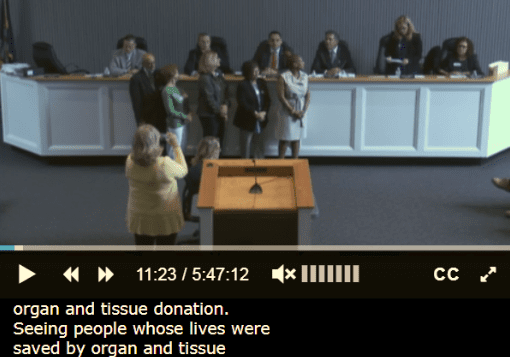One year ago, the Town of Huntington’s board members considered eminent domain proceedings for the Northport power plant as a potential outcome to LIPA’s tax lawsuit against the Town of Huntington.
A newly released report on the topic, prepared by the town attorney and several other town departments, now suggests the legal obstacles just may be too great for the town to overcome.
“Let’s take it, let’s take it now.”
— Eugene Cook
The report notes that eminent domain proceedings would render the power plant property exempt from taxes, a situation that would result in the loss of $55 million in taxes to the Northport-East Northport school district.
Town Supervisor Chad Lupinacci (R) found this aspect of the situation to be unacceptable.
“After reading the thorough report prepared by the town attorney, it is my position that eminent domain of the Northport power plant would not be feasible and would actually harm the Northport-East Northport school district, as well as taxpayers in the Town of Huntington, by making the property tax-exempt,” he said.
Some board members, however, still support the idea of establishing a municipal utility through eminent domain proceedings.
“Let’s take it, let’s take it now,” Councilman Eugene Cook (I) said in a telephone interview. “We can lower taxes; we can reduce energy costs.”
Cook estimates that the plant will likely be used for another 20 to 30 years, and he said that it may become a more important part of the state’s energy plan when Indian Point nuclear power plant closes next year. He’s undeterred by the report.
The detailed legal and financial challenges outlined in the report cite a range of laws, legal opinions and case law to support its findings.
“There is no doubt that General Municipal Law Section 360 authorizes municipalities to own and operate a power-generating facility,” the report states. “However, the grant of authority in Section 360 is limited.”
A main sticking point: The town can generate electricity for itself and its residents. But using only a fraction of the energy that it generates — and selling the rest to a public utility — is legally questionable. The report based this conclusion on a 1989 legal opinion of New York State’s attorney general, which reportedly states that a municipality cannot own and operate a power plant for the sole purpose of selling power to a public utility.
Using the current situation as an example, the report indicates the Town of Huntington would use approximately 15 percent of the energy generated by the Northport power plant, leaving a surplus of 85 percent. The courts would need to determine whether or not the arrangement would be legally acceptable, as stated in the report.
Power of the LIPA statute
Town attorney Nick Ciappetta said the town does not need permission to file eminent domain proceedings to acquire the Northport plant, but he added it’s unclear in LIPA’s Power Supply Agreement with National Grid if the town can step into National Grid’s shoes.
Additionally, the LIPA agreement may also prohibit a local municipality from owning, condemning and operating a power plant in any part of the former LILCO’s service area.
“My focus is on passing legislation that would protect taxpayers across Long Island from LIPA’s nonsensical attempts to destroy communities.”
— Jim Gaughran
“A municipality located within LILCO’s former service area may not establish a public utility service to provide gas or electric power without LIPA’s agreement,” the report states, citing a 1999 attorney general legal opinion.
LIPA spokesman Sid Nathan did not respond to phone calls or questions submitted via email regarding the Northport power plant, but in a May 9, 2018, Times of Huntington-Northport report on the eminent domain proposal, the utility’s spokesperson said that LIPA’s annual $80 million in property taxes for the Northport power plant exceeds its revenue, potentially rendering the decision not in the public’s interest.
If the town board majority remains interested in pursuing the eminent domain option, the next step, as described in the report, would be for the town to hire an accounting firm to analyze the public benefit of operating the power station.
Financial challenges
The Northport board of education weighed in on the loss and determined that it would have to dramatically reduce staff at all levels, eliminate proposed capital improvements, eliminate extra-curricular and academic offerings and significantly increase class size, among other measures.
“Assuming that the town’s operation of the power plant results in a net profit, there does not appear to be a legal mechanism to make the school district whole,” the report states.
This past spring NY State Sen. Jim Gaughran (D-Northport) introduced legislation (§4452a)that aims to supplement school districts and government entities impacted by LIPA’s tax suit with additional state funds. The bills, though, still require support from the state legislature and Gov. Andrew Cuomo (D).
“I stand fully behind the Town of Huntington in their lawsuit with LIPA and I have led the fight in Albany to protect taxpayers threatened by LIPA’s wreckless lawsuits, introducing and passing bills that would do just that,” Gaughran said. “My focus is on passing legislation that would protect taxpayers across Long Island from LIPA’s nonsensical attempts to destroy communities.”
If Gaughran’s bills pass and the board votes to move forward, the report also notes a majority of town voters would still need to approve a public referendum to acquire the power plant.
“This would be a tall order as the power plant lies exclusively within the confines of the Northport-East Northport school district and voters outside of that school district might deem such an acquisition too provincial and/or not in their best interests,” the report states.
Paul Darrigo, a Northport resident who has garnered more than 4,500 supporters through a Facebook campaign Concerned Taxpayers Against LIPA, said he is not yet prepared to comment on the complex idea of taking over the power plant through eminent domain.
The deal, if it gets the green light from board members, the courts and the community, would also be dependent upon the town’s ability to borrow money or issue bonds to finance a municipal utility. If it all worked out, the project would “at a minimum,” reportedly double the town’s outstanding debt.
The Northport power plant, the largest power generating station on Long Island, is owned by National Grid, a multinational business located in the United Kingdom. The plant and its four generating units and support facilities sit on 275 acres along Long Island’s North Shore. The town estimates the value of the property at $3.4 billion and receives $84 million in taxes. The plant burns both oil and gas and is regarded as a major air polluter. Both the American Lung Association and New York State Department of Environmental Conservation have found its ozone emissions, a powerful respiratory irritant, to be a serious public health concern.























